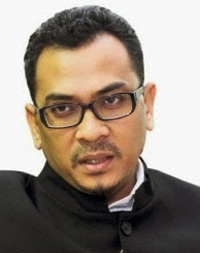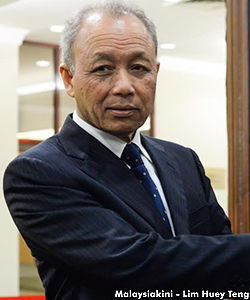The formation of a special court will not resolve the quagmire involving religious tussles, said Malaysian Syariah Lawyers Association (PGSM) president Musa Awang.
He expressed concern that the coram of the special court would become a contentious issue if there is a three-member bench, with regard to the number of Muslim and non-Muslim judges presiding over a particular case.
“If two of the judges are Muslims, it may lead to similar issues arising as there could be someone who is not satisfied. Hence, there is no resolution,” he told Malaysiakini .
 Musa
(photo)
was responding to Court of Appeal judge Hamid Sultan Abu Backer who mooted the special court in his written judgment in the K Pathmanathan vs M Indira Gandhi case.
Musa
(photo)
was responding to Court of Appeal judge Hamid Sultan Abu Backer who mooted the special court in his written judgment in the K Pathmanathan vs M Indira Gandhi case.
On the contrary, the PGSM president said the best remedy would be to allow non-Muslims to seek justice from the Syariah Court.
Disclosing that PGSM is working towards this, Musa said once implemented, non-Muslims can understand the “beauty and just system” in Islam.
“At present, non-Muslims can only attend Syariah Court as a witness to testify in a case, (the practice is) called ‘bayyinah’. It is not impossible that in the not too distant future non-Muslims can be present in (syariah) court to seek justice.
“However, this proposal would need an amendment to the Federal Constitution. But it is not impossible to be implemented. If we want goodness and prosperity of the society, why not make the change,” he said.
Furthermore, Musa opined there is no need for a special court to be formed now as it would only incur additional cost to set up, which involves the appointment of new judges and staff.
However, he said if the special court proposal is allowed, several laws, namely the Courts of Judicature Act 2012 and the Law Reform (Marriage and Divorce) Act 1976, must be amended.
“This is to include the presence or accommodate the Syariah chief judge of the state or his representative in the civil proceedings. The amendments to the two laws are needed in order to form the special courts,” he added.
However, Musa said the formation of a special court should be limited to areas of child custody, alimony and paying child support following divorce.
He pointed out it should not include or hear cases regarding the affirmation of one's faith to Islam as it is already decided in the Court of Appeal decision in the matter of Pathmanathan vs Indira Gandhi and other past cases that such laws of determination lies with the Syariah Court.
“PGSM would like to stress the Court of Appeal had decided that the determination of whether someone is a Muslim or otherwise, is under the exclusive jurisdiction of the Syariah Court. The administration of Islam in state laws give the Syariah Court the jurisdiction to make such pronouncements on whether someone is a Muslim,” he said.
Justice Hamid Sultan, in his dissenting or minority judgment, had written that provisions in state law indicate that in all state syariah legislation, if the issue is to be decided involving a Muslim and a non-Muslim, the jurisdiction does not lie with the Syariah Court.
“Common sense will dictate that it has to fall under the civil courts and convoluted jurisprudence does not help.
 “If some comfort needs to be given to litigants in hybrid cases, it does not stop Chief Justice Arifin Zakaria
(photo)
from directing
special courts
to hear syariah matters between Muslims and non-Muslims with judges conversant in both the laws,” he wrote.
“If some comfort needs to be given to litigants in hybrid cases, it does not stop Chief Justice Arifin Zakaria
(photo)
from directing
special courts
to hear syariah matters between Muslims and non-Muslims with judges conversant in both the laws,” he wrote.
The judge also stated the formation of a special court would help racial harmony and garner respect for the government and its agencies as well as avoid negative global and public perception.
Commenting further, Musa said child custody, alimony, division of property and so forth following a divorce are thorny issues and PGSM is confident if the Syariah Court is given jurisdiction to hear disputes between Muslims and non-Muslims, it would be able to give a just and transparent decision.
The PGSM president cited the Syariah Evidence Enactment, where Section 83 (2) states a non-Muslim who is competent to give “bayyinah” (testify) for a Muslim and if the evidence follows the law, it could be accepted as evidence.
Musa also said the formation of special courts may invade the jurisdiction of the Syariah Courts and if this happen it would contravene Article 121 (1A) of the Federal Constitution.

